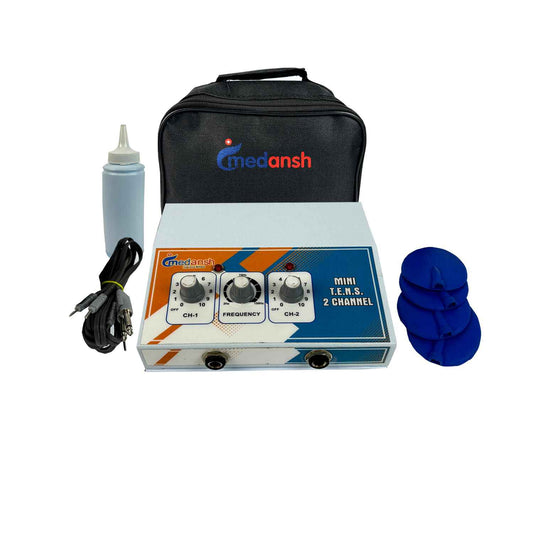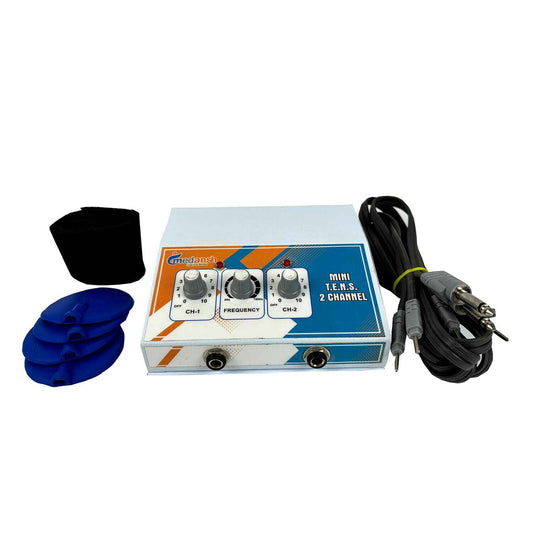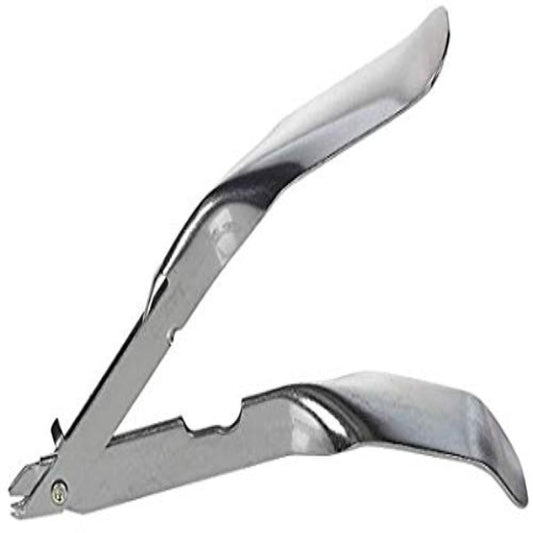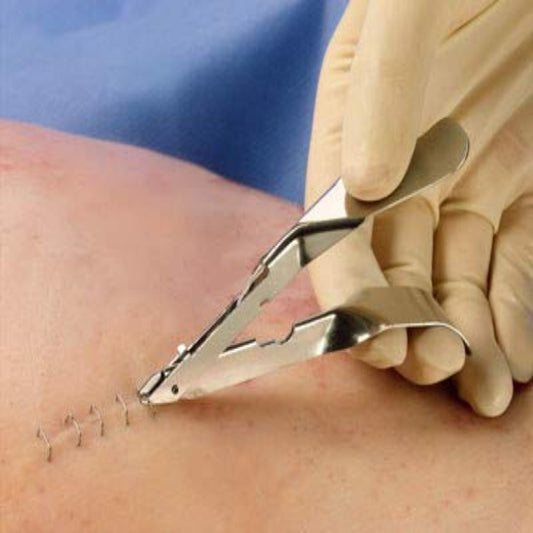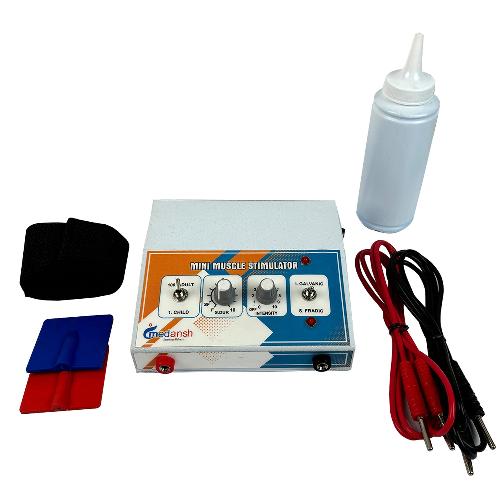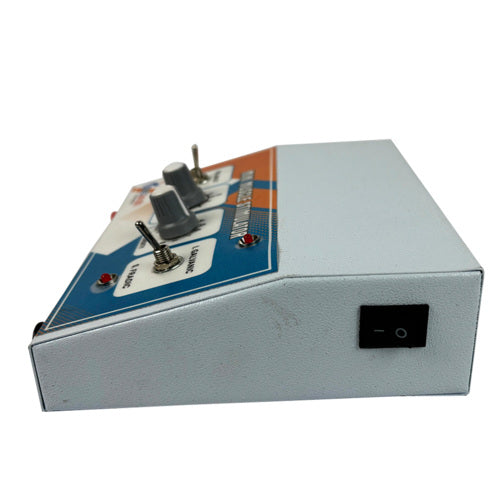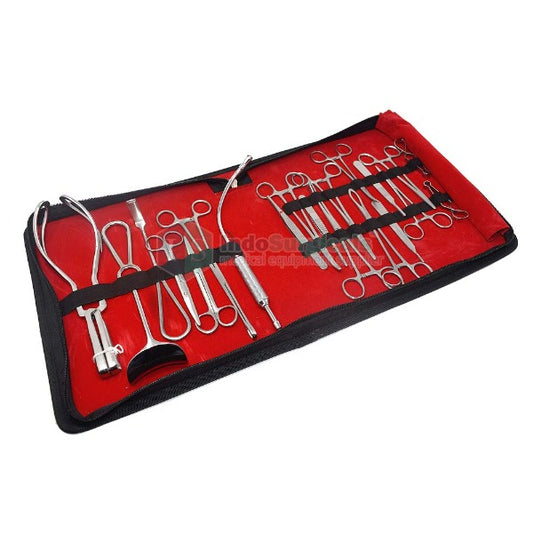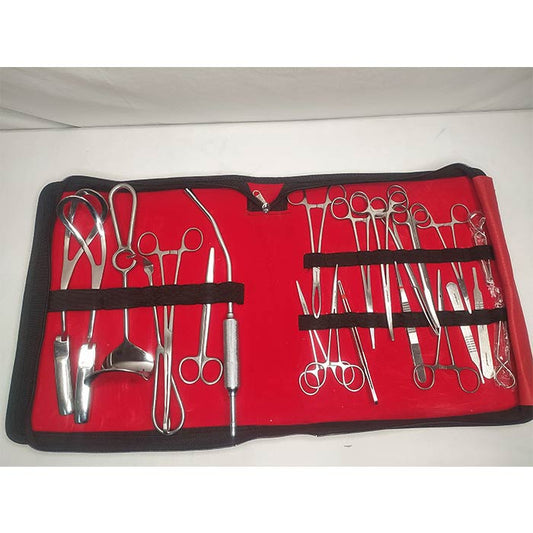-
Cheetal Forceps Jar is idealfor holding sterilizing forceps and other instruments during procedures whilenot in use. Features: Made from surgical gradesteel Corrosion free stainlesssteel Non-sterile and reusable Specifications Value Material Steel Sterile No Reusable yes Size 50x180mm Frequently Asked Question: Q: What is...
- Rs. 643Inclusive of all taxes
Rs. 828- Rs. 643
- Unit price
- per
Save Rs. 185Inclusive of all taxes
-
More sizes availableThe B. P. handle is also referred to as a "Scalpel handle". It has an ergonomic flat shape for improved fingertip control, as well as a slotted tip designed to insert and hold the blade statically. the device's surfaces contain transverse ridges that not...
- From Rs. 350Inclusive of all taxes
Rs. 699- From Rs. 350
- Unit price
- per
Save Rs. 349Inclusive of all taxes
-
More sizes availableIn obstetrics and gynaecology, Vulsellum Forceps are commonly used. Surgical forceps are used to grasp the uterus or cervix during procedures, and each pair has hooks at the tip of each blade. Specifications: Product Vulsellum Forceps Material Metal Surface...
- From Rs. 551Inclusive of all taxes
Rs. 828- From Rs. 551
- Unit price
- per
Save Rs. 277Inclusive of all taxes
-
More sizes availableDuring wound closure, specialty surgery, andother operations, surgeons employ a scissor-like instrument called an arteryforceps to grip, move, and clamp blood arteries. Key Features: Curved profile with transversely serrated jaws. Ergonomic finger rings. Tapered jaws with serrations that help toreduce local injury. Ratchet system...
- From Rs. 579Inclusive of all taxes
Rs. 828- From Rs. 579
- Unit price
- per
Save Rs. 249Inclusive of all taxes
-
More sizes availableCheatle Sterilizing Forceps is a specializedgrasping tool that the operator commonly uses for clamping, holding andmobilizing sterilized devices during surgical procedures in all areas. Its primary function is to transfer sterilisedequipment or packing materials to the hands of the surgeon. Features: Slightly Curved Jawsfor...
- From Rs. 773Inclusive of all taxes
Rs. 644- From Rs. 773
- Unit price
- per
Save Rs. -129Inclusive of all taxes
-
More sizes availableB P Scalpel Handle Surgical Instrument Also known as the Allis clamp, it is a surgical device that is utilised in a variety of surgeries. It is used to grip or grab heavy tissue. Since Allis tissue Forceps can cause harm to soft tissues such...
- From Rs. 413Inclusive of all taxes
Rs. 552- From Rs. 413
- Unit price
- per
Save Rs. 139Inclusive of all taxes
-
Cat-Paw Lacrimal Retractor Frequently Asked Question Q: WHAT IS A CAT-PAW LACRIMAL RETRACTOR? A: The Cat-Paw Lacrimal Retractor is a specialized medical instrument used in ophthalmic procedures to retract the lacrimal punctum, which is the opening in the corner of the eye that...
- Rs. 391Inclusive of all taxes
Rs. 460- Rs. 391
- Unit price
- per
Save Rs. 69Inclusive of all taxes
-
More sizes availableThe B. P. handle is also referred to as a "Scalpel handle". It has an ergonomic flat shape for improved fingertip control, as well as a slotted tip designed to insert and hold the blade statically.the device's surfaces contain transverse ridges that not only...
- From Rs. 364Inclusive of all taxes
Rs. 729- From Rs. 364
- Unit price
- per
Save Rs. 365Inclusive of all taxes
-
More sizes availableProduct Description: The Crile Artery Forceps (Curved) are precision surgical instruments designed to clamp blood vessels and tissues during various medical procedures. Crafted from high-quality stainless steel, these forceps feature a curved design that allows for better access and control during surgeries. The forceps...
- From Rs. 597Inclusive of all taxes
Rs. 690- From Rs. 597
- Unit price
- per
Save Rs. 93Inclusive of all taxes
-
More sizes availableProduct description Babcock Intestinal and Tissue Grasping Forceps is a general-purpose surgical instrument that surgeons can use for grasping many types of tissues, meanwhile, they are suitable to explore the abdominal cavity. It is constructed in premium grade stainless steel with a fine satin...
- From Rs. 579Inclusive of all taxes
Rs. 782- From Rs. 579
- Unit price
- per
Save Rs. 203Inclusive of all taxes
-
More sizes availableThe Adson Artery Forceps is a specialised device used by surgeons in a variety of fields to grasp, clamp, and limit blood flow in small vessels, particularly during tonsil surgeries. Its primary application is to modify blood vessels and manage haemostasis in order to...
- From Rs. 275Inclusive of all taxes
Rs. 552- From Rs. 275
- Unit price
- per
Save Rs. 277Inclusive of all taxes
-
BP Handles SS, Size : No.3, - 1 Pc., BP Handles, SS, Size : No.4 - 1 Pc. Toothed Dissecting Forceps 6" - 1 Pc, Dissecting Forceps, SS, Plain Non-Toothed 6" - 1 Pc. Mayo Scissors, SS, Curved, Size : 180mm - 1 Pc....
- Rs. 5,979Inclusive of all taxes
Rs. 9,200- Rs. 5,979
- Unit price
- per
Save Rs. 3,221Inclusive of all taxes
-
Ensure a safe and sterile cesarean section procedure with our premium kit, equipped with high-quality surgical instruments and supplies. Content : Cesarean Birth Drape With 360 Fluid Collection Pouch and drainage port, Tube holders Incision Film Surgeon Gown 3 Pc Kelly's Pad with fluid...
- Rs. 1,379Inclusive of all taxes
Rs. 2,759- Rs. 1,379
- Unit price
- per
Save Rs. 1,380Inclusive of all taxes
-
Product Description: The Cervical Punch Biopsy Forceps are specialized surgical instruments designed for obtaining tissue samples during cervical biopsies. Manufactured from high-quality stainless steel, these forceps are durable and resistant to corrosion, ensuring a long-lasting and reliable performance. The fine-tuned design and sharp, precise...
- Rs. 1,287Inclusive of all taxes
Rs. 1,840- Rs. 1,287
- Unit price
- per
Save Rs. 553Inclusive of all taxes
-
Key Features Premium Quality Stainless Steel with Superior Craftsmanship Bowman Probes are specialized devices that ophthalmic surgeons frequently use to probe, explore and remove blockages of the lachrymal and nasolachrymal ducts, in order to restore an adequate tear flow Highly polished finish for aesthetic...
- Rs. 505Inclusive of all taxes
Rs. 736- Rs. 505
- Unit price
- per
Save Rs. 231Inclusive of all taxes
-
More sizes availableSizes : 5, 6, 8 and 10 Inch Key Features: Forgings from stainless steel. Silk matte satin finish To grasp and handle soft tissue Used mostly in general surgery Frequently Asked Questions Q: WHAT IS AN ALLIS TISSUE FORCEP? A: An Allis Tissue Forcep is...
- From Rs. 579Inclusive of all taxes
Rs. 736- From Rs. 579
- Unit price
- per
Save Rs. 157Inclusive of all taxes
-
Product description Stainless Steel Reusable Premium Grade Bishop-Harmon Tissue Forceps SS FAQ Q: What are Bishop-Harmon Tissue Forceps used for? A: Bishop-Harmon Tissue Forceps are used in surgery to grasp and manipulate tissues during procedures. They are designed to securely grip the tissue without...
- Rs. 715Inclusive of all taxes
Rs. 920- Rs. 715
- Unit price
- per
Save Rs. 205Inclusive of all taxes
-
Material : Stailness Steel Color : Silver Crafted From High Quality Stainless Steel For Durability. Highly Polished Finish For Aesthetic And Corrosion Resistance. Product Conforms All The Quality Standards. Frequently Asked Questions : Q: WHAT ARE BONE CUTTING FORCEPS SINGLE ACTION USED FOR? A: Bone...
- Rs. 1,563Inclusive of all taxes
Rs. 1,840- Rs. 1,563
- Unit price
- per
Save Rs. 277Inclusive of all taxes
-
More sizes availableProduct Description: The Crile Artery Forceps (Straight) is a high-quality surgical tool designed for clamping arteries during surgeries. Made from premium stainless steel, this instrument provides durability and corrosion resistance, making it an essential tool for surgeons. Its straight design allows precise control, ensuring...
- From Rs. 505Inclusive of all taxes
Rs. 598- From Rs. 505
- Unit price
- per
Save Rs. 93Inclusive of all taxes
-
BP Handle No. 3 - 1 Pc. Ayer Chalazion Forceps - 1 Pc. Desmarres Chalazion Forceps - 1 Pc., Chalazion Currette Set - 1 Pc. Iris Forceps - 3 Pc. Kalt Needle Holder - 1 Pc. Suture Tying Forceps - 1 Pc. Epilation Forceps...
- Rs. 4,369Inclusive of all taxes
Rs. 5,520- Rs. 4,369
- Unit price
- per
Save Rs. 1,151Inclusive of all taxes
Recently Viewed Products
Medansh
Example product title
- Rs. 20Inclusive of all taxes
- Rs. 20
- Unit price
- per
Inclusive of all taxes
Medansh
Example product title
- Rs. 20Inclusive of all taxes
- Rs. 20
- Unit price
- per
Inclusive of all taxes
Medansh
Example product title
- Rs. 20Inclusive of all taxes
- Rs. 20
- Unit price
- per
Inclusive of all taxes
Medansh
Example product title
- Rs. 20Inclusive of all taxes
- Rs. 20
- Unit price
- per
Inclusive of all taxes
Medansh
Example product title
- Rs. 20Inclusive of all taxes
- Rs. 20
- Unit price
- per
Inclusive of all taxes
Medansh
Example product title
- Rs. 20Inclusive of all taxes
- Rs. 20
- Unit price
- per
Inclusive of all taxes
Medansh
Example product title
- Rs. 20Inclusive of all taxes
- Rs. 20
- Unit price
- per
Inclusive of all taxes
Medansh
Example product title
- Rs. 20Inclusive of all taxes
- Rs. 20
- Unit price
- per
Inclusive of all taxes
Medansh
Example product title
- Rs. 20Inclusive of all taxes
- Rs. 20
- Unit price
- per
Inclusive of all taxes
Medansh
Example product title
- Rs. 20Inclusive of all taxes
- Rs. 20
- Unit price
- per
Inclusive of all taxes
- Choosing a selection results in a full page refresh.

